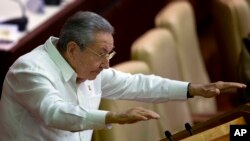President Barack Obama won praise from Cuba's leader Saturday for moving to restore diplomatic relations between Washington and Havana, but President Raul Castro told his nation that the change did not mean the end of communist rule in Cuba.
In a speech to Cuba's National Assembly that was televised throughout the island, Castro said he was open to discussing a wide range of issues with U.S. officials who are expected to visit Havana next month. He also confirmed that he would attend the Summit of Americas in Panama in April, where he is expected to meet with Obama.
Asked in Washington about his move to restore diplomatic ties with Cuba, Obama said Friday that he did not expect dramatic changes in Cuba immediately, but that the U.S. would now have a much greater opportunity for dialogue with the Cuban government and people.
Castro's speech Saturday was his first public comment since the diplomatic breakthrough was announced simultaneously by the two countries' presidents.
Castro said Cuba would accelerate its economic reform program, with the goal of creating a form of “prosperous and sustainable communism.” But he emphasized that changes would be gradual.
Reports from Havana said Castro ended his speech with the words "Viva Fidel," hailing his brother, who led the revolutionary force that seized power in Cuba in 1959. Fidel Castro, 88, who relinquished the presidency to his brother, 83, in April 2011, has not been seen or spoken in public this week.
Obama's and Raul Castro's announcements of their plans to normalize relations after more than 50 years electrified the Americas and sparked widespread speculation about how rapidly the two countries could move closer. White House spokesman Josh Earnes said it was possible that Obama could visit Havana before his term as president ends in January 2017.
The diplomatic breakthrough came as Cuba released Alan Gross, an American contractor arrested in Havana in 2009 for bringing communications equipment to the island. He had served more than five years of a 15-year prison sentence. Cuba said he was freed for "humanitarian reasons."
At the same time, the United States released three Cuban intelligence operatives from U.S. prisons, in exchange for Havana's release of a Cuban man who formerly spied for the United States. He had been in prison for two decades, but U.S. officials said he was one of the most useful intelligence assets they ever had in Cuba.





